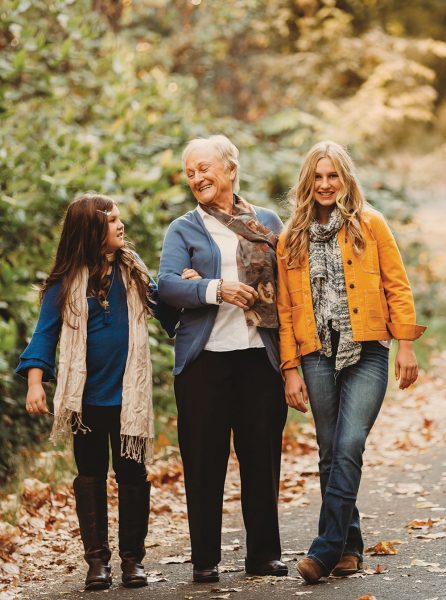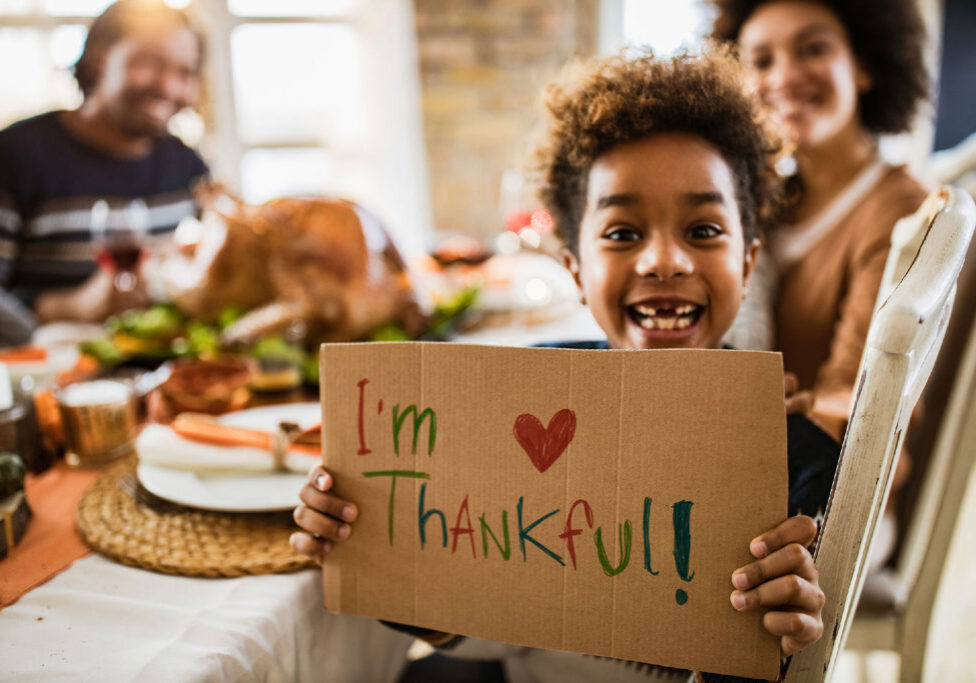
Ella and Sadie Rioux-Coner are growing up in a multi-generational family, spending many happy times with their grandmother, Brenda Rioux
In our contemporary world filled with technology and fast-moving parts and pieces, it can be easy to assume that modern human beings are rewriting the rules. We perceive fundamental changes in all aspects of our lives; from traditional roles to the more flexible positions found in the workplace and the community, and even in our families.
Many of us are creating our families with conscious intent and design. People are living longer, bearing children later in life, divorcing and remarrying, adopting and fostering. Adult children are moving home or not leaving home, and our aging parents are moving out of their homes and into our homes or ADUs (accessory dwelling unit) on our property. Women are working outside of the home in full-time careers, and men are staying home as domestic caregivers. Companies are beginning to offer longer maternity and paternity leave; some companies have on-site daycare. Couples are running businesses out of home offices. The variations are seemingly endless, and with each variation, the responsibilities become more interchangeable.
Family roles are typically traditionally defined but have always been somewhat malleable and today nowhere more so than the role of a grandparent. Like several “traditional” familial roles, the grandparent is one of the more optional ones. Family roles are typically traditionally defined but have always been somewhat malleable and today nowhere more so than the role of a grandparent.
I remember when I was in my 20s, a young mother, with a toddler and expecting my second; it was at a La Leche League meeting that I first began to revisit my idea of grandparenting. We had a new member in attendance with two little ones and pregnant with her third. And she was in her early 40s. In discussing choosing to have children after 40, she said the most obvious thing that I had never thought of before. Simply that if her children made the same decision she had – to wait to start their families until they were in their 40s, she would not be able to be the grandma she had envisioned being. If the culture begins to move in that direction, we will effectively erase the role of grandparent.
I grew up with the lucky experience of knowing both sets of my grandparents. Sadly and unexpectedly, my maternal grandmother died when I was 6 years old, my maternal grandfather when I was 14. My paternal grandparents became great-grandparents, passing away when I was an adult. Grandparents were a respected, important part of my childhood and integral to my interpretation of what family means. My husband did not have the same relationship with his grandparents and grew up considering the role differently.
My father grew up in a multi-generational house. His mother’s parents lived downstairs, and they had the bulk of the parenting duties while his parents worked out of the home full-time. My mother lived in a multi-generational apartment building with a stay-at-home mother. This type of family arrangement was common in the early and mid-20th Century and in many ways is returning as common once more.
In my own family today, we represent the modern construct that seems to define so many families in the 21st Century. My siblings and I are close in age, six years apart. I have an adult child living at home and an adult child with no overt desire to begin her own family any time soon, my youngest sister has two pre-teen children, and my middle sister has just left her career to become the full-time caregiver of one of her grandchildren. Additionally, our father died two years ago, and we are now in the position of caregiving our mother, who will turn 80 next year.
My middle sister has put family first in her life. She has relocated to be closer to her daughter, taking on the caregiver role for her daughter and son-in-law’s child. This coming winter, when her son-in-law deploys, she is going to move her daughter and grandson into her home until he returns. My niece is working long hours as an OB/GYN resident, and my sister will be parenting and grandparenting under the same roof. Her son lives three states away, and she realizes that she won’t have the same grandparenting relationship with his child, but every Sunday “Gammy” and “Gampy” FaceTime with him, waving into the smartphone camera. They are doing their part to ensure that their long-distance relationship is thriving.
The rest of the week, she imparts domestic joys with her grandchild, the way she parented as the mother of his mother. She is teaching things that most daycares cannot – how to bake cookies, vacuum, shop for groceries.
My youngest sister is mothering young children in mid-life. She is experiencing a different relationship with our mother in her role as a grandmother. My children had both of my parents to grandparent them, and they were 20 years younger. Their role then was companion and cuddler. My mother has noted other grandparents taking part in her granddaughters’ elementary school, volunteering in the classroom, and even carpooling. “How many of them are 80 years old,” she wonders.
My grandmothers taught us how to play rummy and Yahtzee, how to look for four-leaf clovers. Through the virtue of their presence, my grandparents instilled in us the importance of a multi-generational family. Grandparents also teach us, adults and children both, about growing older, about how we age. They teach through their living what dying means. Even with this kind of timekeeping, our grandparents can slow time down, help us celebrate and enjoy unmeasured hours and days.
Living multi-generationally is a choice; your family can evolve and embrace and integrate the generations in ways that are important to you. Grandparents can be a vital part of our understanding of what it is to be a human being, today, yesterday, and tomorrow. Grandparents are how generations touch both the past and the future in the present.
Posted in: Community
Comment Policy: All viewpoints are welcome, but comments should remain relevant. Personal attacks, profanity, and aggressive behavior are not allowed. No spam, advertising, or promoting of products/services. Please, only use your real name and limit the amount of links submitted in your comment.
Trackbacks
-
-
[…] modern families, the role of grandparents ² is evolving significantly. Multi-generational living arrangements are becoming more common, […]
Leave a Reply
You Might Also Like...
Arts for US – A Music & Performing Arts Program for Youth on the Autism Spectrum
A new music and performing arts program, Arts for US, launched in March at Harris Studios in Redding. Designed for children and teens on the autism spectrum, the program gives […]
Fencing Offers Fun, Fitness, Focus and Competition to People Across the Spectrum
Swashbuckler wannabes of America, En Guarde! Fencing, once thought only to be a sport for the elites (and Europeans), is on the rise. Just ask Margaret Brunelle, owner of Chico […]

A Heart For Giving
As a mother, I believe one of the most valuable gifts that I can give to my children is a heart for giving. In a society that places immense value […]

Nurturing Gratitude In Your Home
Take a gratitude break to calm everyone down and gain a new, more uplifting perspective. Get a Happiness Boost Gratitude is one of the most important ways to get a […]



[…] modern families, the role of grandparents ² is evolving significantly. Multi-generational living arrangements are becoming more common, […]